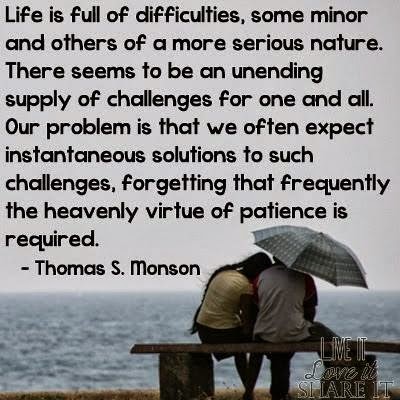This morning, I was studying the Book of Mormon and found some interesting life principles. The Book of Mormon begins in Jerusalem with the prophet Lehi and his family. They have been commanded to leave the city because God is going to destroy it, and the Jews want to take Lehi's life. Nephi and Sam, the younger brothers, go willingly. However, Laman and Lemuel, the older brothers, complain and murmur the whole way.
"And it came to pass that the Lord commanded my father, even in a dream, that he should take his family and depart into the wilderness. And it came to pass that he was obedient unto the word of the Lord, wherefore he did as the Lord commanded him. And it came to pass that he departed into the wilderness. And he left his house, and the land of his inheritance, and his gold, and his silver, and his precious things, and took nothing with him, save it were his family, and provisions, and tents, and departed into the wilderness...And thus Laman and Lemuel, being the eldest, did murmur against their father. And they did murmur because they knew not the dealings of that God who had created them."
(1 Nephi 2: 1-3, 12)
I love the faith of Lehi and Nephi. Leaving everything behind must have seemed hard, but they believed that God had something greater in store for them. In fact, a short time after, Nephi is promised some amazing blessings from God about being a ruler, teacher, great nations, and a promised land as inheritance. That alone shows that the Lord is going to bless the faithful with things greater than what they left behind. Like all other blessings, they are based upon faithfulness. Then, Lehi tells Nephi that he needs to go back to retrieve important knowledge about their ancestors, and revelations about Christ's coming. Nephi doesn't say, "Come on! The Lord just told me I am going to have all these great things! He's already promised them to me. I already have them, so why can't I have them now?!" Instead, his reply was full of faith and obedience. He said he would go, because he had a testimony now that God could make anything possible when he asks it of us. Lehi is then relieved, and he knows that Nephi has been blessed with obedience and diligence.
"...Laban hath the record of the Jews and also a genealogy of my forefathers, and they are engraven upon plates of brass. Wherefore, the Lord hath commanded me that thou and thy brothers should go unto the house of Laban, and seek the records, and bring them down hither into the wilderness. And now, behold thy brothers murmur, saying it is a hard thing which I have required of them; but behold I have not required it of them, but it is a commandment of the Lord... I, Nephi, said unto my father: I will go and do the things which the Lord hath commanded, for I know that the Lord giveth no commandments unto the children of men, save he shall prepare a way for them that they may accomplish the thing which he commandeth them. And it came to pass that when my father had heard these words he was exceedingly glad, for he knew that I had been blessed of the Lord."
(1 Nephi 3: 3-5, 7-8)
 Laman and Lemuel, however, aren't feeling the same way as Nephi. They go on this adventure, but they do so begrudgingly. They don't want to, because they don't believe in the promises of God. After a failed first attempt, they want to quit!
Laman and Lemuel, however, aren't feeling the same way as Nephi. They go on this adventure, but they do so begrudgingly. They don't want to, because they don't believe in the promises of God. After a failed first attempt, they want to quit!
Both in missions and in normal lives, we sometimes do the same. We are promised blessings, are asked to do something from God, and we do it. But when we aren't given blessings immediately, we become discouraged. We start to think "I am doing all the right things. I am being obedient and following commandments! Why am I not being blessed for it? Doesn't Heavenly Father see what I'm doing?"
One of the greatest lessons my own dad taught me was that everything is more appreciated and special to us when we work for and earn it ourselves. If Heavenly Father just gave us blessings immediately all the time, would we appreciate them as much? Would we value them as highly as we do if we didn't have to do anything for them? Laman and Lemuel didn't want to work to receive a reward. They wanted it to be easy so that they could go home and complain more. Nephi, however, still had a testimony that God was striving with them. He taught his brother's a little about the principle of faith in adversity, and then continued forward.
results, then we aren't being obedient. That may be the case, but more often than not it is simply because our Father in heaven wants us to learn to trust him and be faithful/diligent to what he has already asked us to do! The Lord is always aware, and will bless us at the perfect moment according to his perfect timing!



